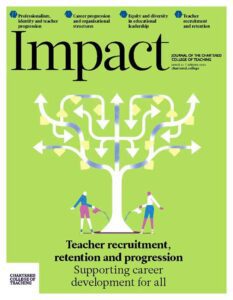From the Editor

Paul W. Miller, PhD, Professor of Educational Leadership and Social Justice; Principal Consultant and Director, Educational Equity Services, UK
I am pleased to have been asked by the Chartered College of Teaching to guest edit this issue on teacher recruitment, retention and progression. These issues (recruitment, retention, progression) are fraught, and examining them together provides an opportunity to make comparisons and, ultimately, more authoritative judgements about the state of play. In December 2018, globally, there was a shortage of teachers of 17 million, with industrialised countries such as England missing their recruitment targets for up to seven years in a row (Carr, 2019). During periods of economic recession, however, teaching tends to attract more entrants, many of whom may not have previously thought about teaching as a career. The Education Policy Institute estimates that recruitment of teachers could increase by up to 40 per cent as a direct result of the COVID-19 recession (Fullard, 2020). Understandably, more people will now turn to teaching and fewer people will want to leave teaching, due to the relative stability and security of the teaching profession.
Teacher recruitment, however, cannot be left to supernatural or other events such as the COVID-19-induced recession, but should be a deliberate strategy of government. The fact that the government has missed teacher recruitment targets for seven years suggests that the system is broken and is in urgent need of new ideas and adequate investment. The recession due to COVID-19 may have also ameliorated a retention crisis, but what is the government’s longer-term strategy? Schools are also implicated in the retention issue, for it is one thing for teachers to be recruited but another for them to be retained, and the job of retaining them takes place within schools. How do schools support staff? How do schools develop staff? How fair are school policies and practices to all staff? Do schools create an institutional habitus that makes staff want to stay and work there? Do schools create an institutional habitus where all staff have equal opportunity to achieve and to thrive? These are issues that cannot be resolved by the government, but instead need to be considered by school leaders in the ways in which they ‘culture’ their schools.
Teacher progression is an equally if not more problematic issue, especially for female teachers, teachers of BAME heritage and overseas-trained teachers. The ‘othering’ of teachers through policy (in the case of overseas-trained teachers) and institutional practice sediments cultural inequality and the politics of knowledge. Which teachers get rewarded and recognised for their efforts? Which teachers’ voices are marginalised, silenced or overlooked? Which leaders proactively seek to address recruitment, retention and progression challenges, and how do they do this? How do school leaders create an equity-based culture of recruitment, retention and progression for all? These questions are important for us to consider in the context of this issue and of wider educational practice.
The Equality Act (2010) bans positive discrimination but promotes positive actions. What are positive actions and how well do school leaders understand and utilise these in recruitment, retention and progression? The challenges signalled in this brief editorial are examined in the papers comprising this issue. Furthermore, this issue provides examples from practice, where schools/school leaders have been engaged in strategic leadership, ‘practice borrowing’, positive actions and/or other institutional actions to improve and sustain recruitment and retention and to ‘level up’ opportunities for all. This issue provides examples of ongoing barriers and challenges to recruitment, retention and progression, against a backdrop of a deeply unequal society and teaching profession. Notwithstanding this, the issue also provides examples and accounts of schools and school leaders working against the tide of inequity in their schools to map and carve out pathways for all teachers, including those in initial teacher education. This issue, steeped in practice, is an excellent account and critique of recruitment, retention and progression in the teaching profession, led by those who work in it and augmented by those who study it. Presented over four sections, this issue offers insights and examples within the areas of: (i) professionalism, identity and teacher progression; (ii) career progression and organisational structures; (iii) equity and diversityThe recognition of individual differences in terms of race, ethnicity, gender, sexual orientation, socio-economic status, physical ability, religious beliefs and other differences in educational leadership; and (iv) teacher recruitment, retention and initial teacher education. Each article offers a unique perspective, adding depth and richness to the issue as a whole. It is on this basis that I commend this issue to you.
The guest editor of this issue, Professor Paul W. Miller, is Director of Educational Equity Services, an organisation that offers chargeable services to educational institutions.
References
Carr J (2019) Government misses secondary teacher training target for SEVENTH year in a row. Schools Week, 28 November, 19. Available at: https://schoolsweek.co.uk/government-misses-secondary-teacher-training-target-for-seventh-year-in-row (accessed 11 January 2021).
Fullard (2020) Teacher supply and Covid-19. Education Policy Institute. Available at: https://epi.org.uk/publications-and-research/teacher-supply-and-covid-19/ (accessed 11 January 2021).










